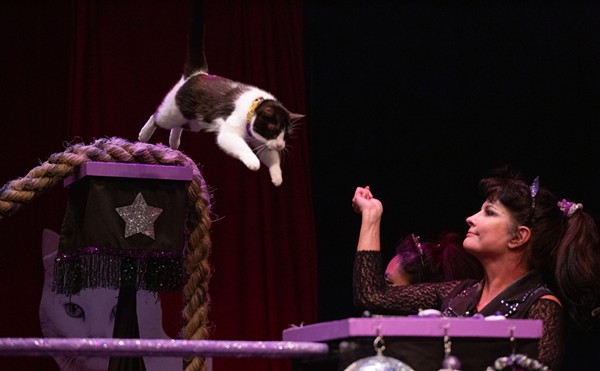It was a night for silliness to shine as the San Antonio Opera presented a crisp, colorful performance of W.S. Gilbert and Arthur Sullivan’s popular The Mikado in collaboration with California’s Opera A La Carte.
This was a straightforward presentation of the comic opera from a company that has built its reputation upon authenticity, certainly a creditable standard to uphold. It was, perhaps, close to the production that first opened at the Savoy Theatre in London, March of 1885. Set in Japan, the opera was never really about Japan, of course, but used the exotic locale as a platform from which the composers launched jabs at British conventions and institutions.
Don’t come to this performance anticipating the topical humor that has become the traditional way of updating some of the patter — though a single reference to Alamo Heights was allowed to slip in. In the “Little List” song, for instance, we hear the original sarcastic reference to “the lady novelist.” Gilbert, though, is said to have begun cutting this remark from the libretto as “lady novelists” became less of an oddity.*
The play opens in the fanciful town of Titipu, where we meet the hero, Nanki-Poo (Craig Gilmore), son of the emperor, the great Mikado (director Richard Sheldon). But, Nanki-Poo has fled his father’s court (disguised as a second trombone) to wander the land, in shreds and tatters. He seeks the lovely Yum-Yum (Carol Winston), with whom he’s fallen in love. But, Yum-Yum, to her distress, is engaged to Ko-Ko (Eli Villanueva), her guardian, a former tailor who is now Lord High Executioner. Ko-Ko will soon be called upon to exercise his office. The Mikado has sent him a letter indicating his concern that no executions have been held in Titipu for an entire year.
This improbable beginning sets us on a road full of twists and turns, plots and pratfalls, chicanery, threats, and all sorts of low humor. Clowning is especially required of the hapless Ko-Ko. He races around in a frenzy trying to appease the Mikado and still get the girl — while getting rid of Nanki-Poo. As the plot thickens, he talks the suicidal Nanki-Poo into volunteering for execution, allowing him to be married to Yum-Yum for a month before his head comes off. But no, that won’t work either, since the widow would have to be buried alive. Yum-Yum, predictably, balks.
Villanueva, as Ko-Ko, is a natural comic whose talent beguiles us from every corner of the stage. He is almost too attractive — this Ko-Ko just maybe should have won his maiden’s heart. Winston plays Yum-Yum rather passively, though she turns on the energy during the wonderful “Here’s a Howdy Do” with Ko-Ko and Nanki-Poo, and her solo, “The Sun Whose Rays Are All Ablaze,” is sweetly lovely.
Ko-Ko is finally backed into a corner by circumstance and must romance the older (well-padded and homely) Katisha (Adelaide Sinclair) in order to stay in the Mikado’s good graces. As the scorned Katisha, now being insincerely wooed by Ko-Ko, Sinclair uses her vibrato-rich contralto expertly to make the character transitions from grim to droll to heartbroken.
The ensembles, from the opening scene to the sparkling “Three Little Maids from School” to the madrigals, were polished. At times, the very good San Antonio Opera Orchestra, conducted by Alexander Ruggieri, and musicians onstage faltered to get it together. Also, amplification of individual voices was at times uneven, as though there weren’t quite enough clip-on microphones to go around.
On the positive side, the many-titled Pooh-Bah (Rollin Lofdahl) was properly sneering and self-important as the Lord High Everything Else (but executioner). His baritone rumbled confidently down to basement notes, while Gilmore’s strong, brilliant-toned tenor ably handled the high notes required of Nanki-Poo. Ann Noriel darted nimbly through her part as a perfect Pitti-Sing (another ward of Ko-Ko’s and one of the “three little maids.”)
For fans of Gilbert’s witty lyrics and Sullivan’s musical genius, this production of The Mikado demonstrates just why it is thought to be the duo’s most popular light opera. From the vocal expertise to the staging, we found most of the constantly moving parts polished to a delightful finish. Go. Enjoy.
The San Antonio Opera season continues June 12-14, with Verdi’s Il Trovatore. Details and tickets available at saopera.com.
This review originally erroneously stated that Sullivan had changed the libretto.
The Mikado
Through March 22
$25-$110
San Antonio Opera
Lila Cockrell Theatre
saopera.com
ticketmaster.com
















